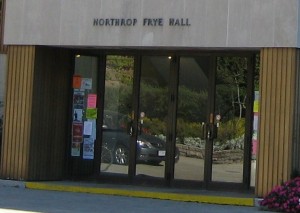
Like Russell, I am reading Bob Denham’s selection of Frye’s correspondence. This observation to Edith Sitwell in April 1948 caught my attention:
Once a critic learns his job, criticism ought to come very easily, for if he is writing about a greater man than himself (the normal procedure), he has that man’s power available and ready to be tapped, if he will only realize that it is greater, and puncture a hole in the dam of his own ego. The arrogance and self-sufficiency I find in so much contemporary criticism, especially in America, bewilders me, as it seems to make things needlessly difficult.
The “arrogance and self-sufficiency” of scholars seems to be a perennial problem.
As Russell points out, Frye dedicated himself to Victoria College, even though in the diaries (which end in 1955) he complains about how stifling the institution could be and occasionally wonders if he shouldn’t take up one of the better offers coming his way. On January 19, 1950, he observes, “I am worried about my future as a first-class scholar in a second-class institution.”

Yes, it’s hard to imagine an academic who did not have contradictory or inconsistent feelings about the institution to which he or she belongs. To provide a further contrast with Michael’s quotation from the diaries, here is Frye reflecting on Princeton in 1954: “It’s a very small town really, and, as in Harvard, we find that the normal tendency is to gossip. Toronto is much more stimulating intellectually than either place, as far as staff is concerned. Students are another matter.” He continues in a satirical vein about American education and then shifts to American politics. It is in fact easy to imagine expanding this letter of 18 June 1954 into a campus novel about an introverted Canadian genius visiting an Ivy League campus.